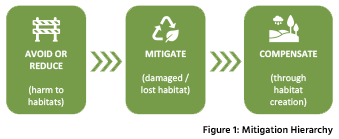Biodiversity Net Gain
Another blossoming requirement for the planning system
The deadline for the introduction of the Government’s mandatory Biodiversity Net Gain (‘BNG’) requirement is fast approaching (November 2023). As BNG is proposed to be secured via the planning process, we expect to see changes to how applications are structured and then determined by Local Planning Authorities (‘LPAs’).
Some BNG Background
The Environment Act 2021 brought in to law a mandatory ‘Biodiversity Gain Objective’ for development – basically that any development for which planning permission is granted must deliver an improvement of at least 10% to the biodiversity value of the on-site habitat.
This effectively is what we refer to as BNG i.e. “an approach to development which means that habitats for wildlife must be left in a measurably better state than they were in before the development”. BNG adopts a cascading ‘Mitigation Hierarchy’ approach, as shown in Figure 1, which all development needs to follow.
The idea is that the BNG requirement will be secured and enforced via the planning system. BNG requirements are not a new concept in planning – some LPAs have been securing biodiversity enhancements under planning policy for some time now – however, what is new is that the 10% will be enshrined in law and therefore will operate in a similar way to the Community Infrastructure Levy (‘CIL’) i.e. non-negotiable.
Whilst we know the basics about the new requirement, we are still yet to see any full detail for how this will work in practice. DEFRA and the DHLUC are working on implementing the regime and in January 2022 DEFRA consulted on the practical and legal implementation details of the BNG requirement. In April this year DEFRA published a response to that consultation which gave some good indicators of what we can expect, but to date we are still waiting on secondary legislation / regulations, amendments to national planning policy and guidance to formally set out how the new regime will be implemented.
Notwithstanding this, given the planned November 2023 implementation date, we are advising our clients on potential BNG requirements now and how these can potentially be managed for planning applications.
Download the briefing full note to find out what we know (and don’t yet know), and the potential future implications, challenges, opportunities and unknowns. If you would like to discuss BNG in the context of any planning or development strategy, please do contact a member of our Planning & Development team who would be happy to assist.
Related Services
Cookie Policy
Privacy Overview
| Cookie | Duration | Description |
|---|---|---|
| cookielawinfo-checkbox-analytics | 11 months | This cookie is set by GDPR Cookie Consent plugin. The cookie is used to store the user consent for the cookies in the category "Analytics". |
| cookielawinfo-checkbox-functional | 11 months | The cookie is set by GDPR cookie consent to record the user consent for the cookies in the category "Functional". |
| cookielawinfo-checkbox-necessary | 11 months | This cookie is set by GDPR Cookie Consent plugin. The cookies is used to store the user consent for the cookies in the category "Necessary". |
| cookielawinfo-checkbox-others | 11 months | This cookie is set by GDPR Cookie Consent plugin. The cookie is used to store the user consent for the cookies in the category "Other. |
| cookielawinfo-checkbox-performance | 11 months | This cookie is set by GDPR Cookie Consent plugin. The cookie is used to store the user consent for the cookies in the category "Performance". |
| viewed_cookie_policy | 11 months | The cookie is set by the GDPR Cookie Consent plugin and is used to store whether or not user has consented to the use of cookies. It does not store any personal data. |

